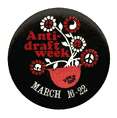 |
Viet Nam Generation Journal Online
Volume 3, Number 3
Viet Nam Generation: A Journal of Recent History and Contemporary Issues was founded in 1988 by Kalí Tal. It has been the journal of record in Sixties and Viet Nam war studies since its inception. The current volume is 7:3-4. Do to lack of funds and understaffing there have been no new issues of the journal produced since 1996, but we're working to rectify the situation. In the meantime, we've made these back issues available to you on-line. Hardcopy versions of this issue may be purchased from our Bookstore.
- In This Issue
- Publisher's Statement, by Kalí Tal
- Announcements, Notices, & Reports
- Cortez in Darien, by Alan Farrell
- Fiction: The Romance of Vietnam, by Renny Christopher
- A Firebell in the Night, by William M. King
- Topics for Vietnamese-U.S. Cooperation, by Tran Quoc Vuong
- Science Fiction: This Time It's War, by Alasdair Spark
- My Last War, by Ernest Spencer
- Metaphor and War, by George Lakoff
- Poetry by Stephen Hidalgo
- The Speed of Darkness and "Crazed Vets on the Doorstep Drama,"; by David J. DeRose
- REMF Books, by David Willson
- Poetry by Peter Desy
- Voices from the Past: The Search for Hanoi Hannah, by Don North
- Hollywood Confidential, by Fred Gardner
- Poetry by Dennis Fritzinger
- The All-Vietnamese Chinese Mercenary Basketball Tournament, by Paul Ohmart
- (Not Much of a) War Story, by Norman Lanquist
- Poetry by Norman Lanquist
- Another Tale of There and Back Again, by David Connolly
- Film: Buddy Counts, by Cynthia Fuchs
- Poetry by Bill Shields
- And He Blessed Me Unaware: Veterans Eve 1989, by Gretchen Kay Lutz
- Poetry by Bill Jones
- Poetry by Jon Forrest Glade
- Poetry by Leroy Quintana
- Still the Street Without Joy, by Robert Flynn
- Book Reviews: Marilyn B. Young, The Vietnam Wars, 1945-1990, reviewed by Dan Scripture; Barbara Cohen, The Vietnam Guidebook, and Lonely Planet's Vietnam, Laos, and Cambodia: A Travel Survival Kit, reviewed by Dana Sachs; Robert Bly, Iron John: A Book About Men, reviewed by Daniel Egger; Delores A. Koenning, Life After Vietnam, and Lynda Van DeVanter and Joan A. Furey, Visions of War, Dreams of Peace, reviewed by Sandy Primm; Richard Wilmarth, Poised for War, and Jon Forrest Glade, Photography of the Jungle, reviewed by Bill Shields

Texts made available by the Sixties Project, are generally copyrighted by the Author or by Viet Nam Generation, Inc., all rights reserved. These texts may be used, printed, and archived in accordance with the Fair Use provisions of U.S. Copyright law. These texts may not be archived, printed, or redistributed in any form for a fee, without the consent of the copyright holder. This notice must accompany any redistribution of the text. A few of the texts we publish are in the public domain. For information on a specific text, contact Kalí Tal. The Sixties Project, sponsored by Viet Nam Generation Inc. and the Institute of Advanced Technology in the Humanities at the University of Virginia at Charlottesville, is dedicated to using electronic resources to provide routes of collaboration and make available primary and secondary sources for researchers, students, teachers, writers and librarians interested in the 1960s. |

In This Issue
This newsletter still doesn't have any reporting on recent developments in U.S. relations with Southeast Asia. We come out quarterly so we can't keep up with the Cambodia negotiations. The basic thrust of them is always that the U.S. is eager to establish full diplomatic ties with Pol Pot, but the details are important. You should all subscribe to Indochina Digest, or one of the other newsletters devoted to political reporting. I'll print a roundup of such services in the next issue.
I can't wrap up this issue in one short notice. It's too big. The Features section starts with Alan Farrell on traumatic amputation in Homer. Renny Christopher inaugurates her regular fiction column with a piece on Danielle Steel and other romance novelists who have imagined the war. It goes on and on after that, one great poem or essay after another. We've got Cynthia Fuchs and David J. DeRose addressing about 30 plays and movies. We've got Dennis Fritzinger, LZ Friendly editor, with a poem about surfing against Ho. We have vet biker tattoo fetishist Norman Lanquist in both a poem and an essay. We've got memoirist Ernest Spencer and linguist Gordon Lakoff and poet Stephen Hidalgo on Desert Storm, we've got David Connolly talking about Orcs and hobbits at the old firebase, we've got dozens of pages of informative and entertaining writing. Journalist Don North interviews Hanoi Hannah, and Fred Gardner recalls Jane Fonda's raid on the G.I. movement. Paul Ohmart reveals the greatest Green Beret boondoggle of all time. Alasdair Spark shows once and for all, with diagrams, that Aliens is a Vietnam War movie. Our Book Editor evaluates Marilyn Young's new history of the war. Dana Sachs reviews the new edition of Barbara Cohen's Vietnam guidebook. Bill Shields revie"?0ard Wilmarth and Jon Forrest Glade. Shields and Glade and Leroy Quintana and Peter Desy and cowboy Bill Jones all contribute poems. Daniel Egger gives a fair summary of Men's Movement poet Robert Bly's recent work. Sandy Primm takes a quick look at Delores Koenning's home psychiatric manual for veterans, and at Lynda Van DeVanter and Joan A. Furey's collection of women's poetry from the war. Gretchen Kay Lutz talks about her walk by the Wall. Men's magazine writer and novel ist Robert Lopez Flynn revisits Camp Baxter. William M. King, Director of Afro-American Studies at Boulder, expounds on the riots of '67. David Willson natters on about the glorious role of clerk-typists in our nation's military history. We're honored to have Tran Quoc Vuong, one of Hanoi's top academics, proposing a list of potential joint ventures between U.S. and Vietnamese scholars.
There's lots more. Read the Table of Contents. Read the Announcements, Notices, and Reports. Read the Features and Book Reviews. Write us a letter about what you're up to.
--Dan Duffy,Vietnam Generation Newsletter Editor

Publisher's Statement
As you have certainly noticed by now, this issue represents a departure from our usual format. We decided to print a special combined journal/newsletter because we had a massive backlog of interesting and well-written material which simply didn't fit into our standard anthologies. You will find a little bit of everything here: poetry, fiction, memoirs, essays, reviews and interviews.
Our format will continue to evolve, and we hope that you will keep us informed about what you like and what you don't like. As a completely subscriber-supported enterprise, Vietnam Generation is shaped by the needs and desires of its readership. This means that we read and carefully consider every comment and suggestion we receive.
Status Report
To date, approximately 125 libraries subscribe to Vietnam Generation., including college and university libraries, state historical associations, public school and community libraries, and military libraries. New library subscriptions are coming in every month, and most new subscribers buy back issues. You can help this process along by going to your own institution's library and inundating it with requests to subscribe.
Like most journals, we have a hard time keeping up with our individual subscribers. Libraries renew on a regular basis, but individuals are busy people with complicated lives and it's often hard for them to remember to write that check and send it off. Since Vietnam Generation operates hand-to-mouth, we can't really afford to send out more than one or two renewal notices before subscriptions expire. Since the journal was founded we've had over 400 individuals subscribe, but only about 100 of them are paid up at any given time. We heartily encourage you to keep your subscription up to date. Every $40 counts.
The indefatigable Dan Duffy, Newsletter Editor, has volunteered to write personal letters to each of our lapsed subscribers in the hopes that he will be able to make them feel guilty enough to send us a check.
We have received about $600 in donations this year. Most of that has come in small amounts$10 or $15 in addition to a renewal check. We really appreciate that contribution, and just want to let all of those who sent in a little extra that it made a big difference. We did get one $300 donation from one supporter. He knows who he is; we just wanted to thank him here.
I'm happy to report that professors have started to use journal issues as course texts. So far, the most popular selections are A White Man's War: Race Issues and Vietnam, and GI_Resist_cont.html. I think Swords Into Plowshares may become a big seller this year. Kinko's and other copy shops have begun to send requests for permission to xerox articles for course anthologies, which is also a good sign. (Our policy, by the way, is to allow professors to copy up to two articles from any single journal issue, at no charge. We do request that if you are going to use more than two articles from one issue, that you ask your students to purchase the book.) We discount books used for courses (25%), but if your students must purchase them through a university bookstore, this discount is often not passed on. For those professors who feel comfortable with the idea of selling the texts directly to the student, we can arrange to send the correct number of copies and have you collect the money and send us a check. This way students can pay $8 instead of $12 for an average issue.
What I Think of the Newsletter
Delegating responsibility is both a wonderful and a painful experience. Since Dan has taken over the position as Newsletter editor, I have been delighted to note a marked improvement in literary quality, an increase in the number of submissions, and the introduction of a regular series of features and reviews into the publication. All good newsletters are shaped by the idiosyncratic style of their editors, and it's become clear to me that Dan lives up to the finest traditions of the genre: his witty and elegant prose betrays an Unshakeable Bad Attitude. I look forward to doing page-layout and proofreading the Newsletter(a task I formerly dreaded) because this the first look I get at most of the material we're printing.
The painful part of delegating responsibility, however, is that sometimes things don't go quite the way I want them too. There seem to be too few women's voices in the Newsletter these days. I get worried when I notice the preponderance of masculine testimonial, even if much of it is written by certified Sensitive Guys. As conscious feminist voices, Renny Christopher and Cynthia Fuchs seem clearly outnumbered. In this context, sympathetic reviews of Robert Bly make my gorge rise... I'd urge Dan to actively seek more feminist contributors.
And on a Personal Note...
This has been quite a year for me. I did finally manage to finish my dissertation ( Bearing Witness: The Literature of Trauma ) and I received my Ph.D. in American Studies from Yale University this last May. The tremendous relief of waking up every morning and realizing that I don't have to work on the dissertation has recently been replaced by the stress of realizing that I do have to work on the book. Clearly, it's a tremendous improvement. Not least of my delights is the knowledge that I will never have to set foot in Mother Yale's hallowed halls again.
I'm working as a consultant at the U.S. Holocaust Memorial Museum, revising my dissertation for publication (I'll be more forthcoming about that when I've signed a contract), and doing my best to get Vietnam Generation typeset, printed and mailed out four times a year. Like the Red Queen, these days I run twice as hard to stay in the same place. I miss teaching, but I won't look for a full-time faculty position until the Holocaust Museum finally opens in 1993.
--Kalí Tal